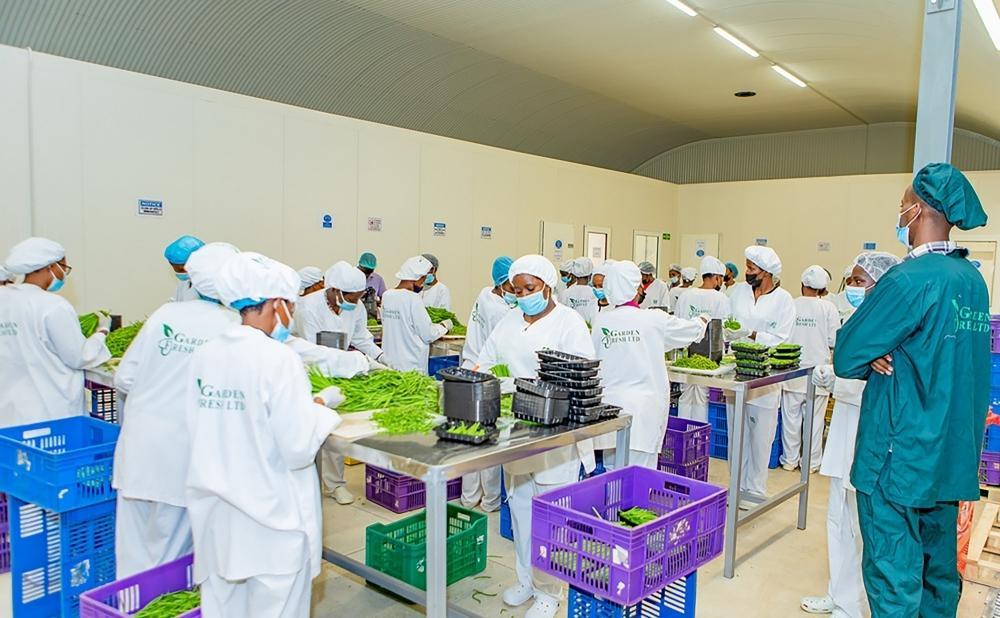Charles Nyandwi
Africa-Press – Rwanda. Rwanda’s trade policy is being revised to address long-standing gaps that have limited the country’s trade performance and competitiveness.
A revised policy will address issues such as a narrow and low-value-added export base, limited diversification of products and markets, weak links between investment and export growth, and an underdeveloped services trade sector, according to the Ministry of Trade and Industry.
Doreen Ntawebasa Hategekimana, the Director General of Trade and Investment at the Ministry, told The New Times that the changes will also tackle high trade logistics costs, low competitiveness among micro, small and medium enterprises (MSMEs), limited participation of women and youth, lack of climate resilience in trade, and poor access to trade finance and export insurance.
She said the new trade policy has been developed with key considerations, including its alignment with national development priorities. These are Vision 2050 and the National Strategy for Transformation (NST2), both focused on industrialisation, value addition, and export-led growth.
It also integrates complementary policy frameworks such as the Industrial Policy (2024–2034), the National Export Strategy II, and the Private Sector Development and Youth Employment Strategy, she explained.
According to Hategekimana, the policy seeks to promote inclusive, sustainable, and resilient trade development that benefits all segments of society.
It also aims to strengthen Rwanda’s participation in regional and global trade frameworks, including the East African Community (EAC), Common Market for Eastern and Southern Africa (COMESA), African Continental Free Trade Area (AfCFTA), and the World Trade Organisation (WTO).
“The new trade policy introduces several innovative elements aimed at transforming Rwanda’s trade ecosystem, including the establishment of a digital trade and e-commerce framework aligned with the AfCFTA Protocol on Digital Trade; development of a dedicated services trade strategy; targeted initiatives to support women, youth, and MSMEs in accessing trade opportunities,” she said.
It is expected to enhance the “integration of climate-smart and green trade initiatives, such as promoting organic and fair-trade exports; and expansion of trade finance, export credit, and insurance mechanisms to enhance access to financing for exporters.”
In addition, she said the policy aims to boost trade facilitation and competitiveness through new interventions. These include setting up legal and regulatory frameworks for e-signatures, e-payments, and data protection to enable digital trade, as well as supporting SMEs to engage in e-commerce platforms and use digital trade finance tools.
It will promote eco-commerce and environmentally sustainable value chains, strengthen simplified trade regimes and cross-border infrastructure to support small-scale and informal traders, and expand services exports in sectors such as ICT, tourism, logistics, and professional services.
Hategekimana indicated the review of trade policy was informed by consultations involving key stakeholders, including government institutions, private sector players, and development partners.
What do players suggest?
Frodouard Kabano, Managing Director of Geomining, a mining company based in Kicukiro District, said that while mineral exports have potential to grow, challenges remain in transportation and cargo security.
“The products are expensive, which makes them vulnerable to theft during transportation,” he said.
He added that a lack of trust between exporters and foreign buyers remains a barrier.
“Most exporters prefer to ship only after receiving payment, while foreign buyers prefer to pay once goods reach the port.”
He added that some exporters use air transport to reduce risk, but that option is costly.
Kabano noted that e-commerce could build trust between trading partners, but that the security of cargo still poses a major concern.
Aimee Dusabe Bahizi, Managing Director of Gitesi Coffee Washing Station, said transport costs and the lack of value addition remain significant challenges for the coffee sector.
“We need to produce finished products so that our market can expand,” she said. “Digital platforms mostly favour finished goods, yet access to finance is still limited even though some banks are starting to work with farmers. The new policy should strengthen that support.”
For Herman Uwizeyimana, General Manager of Fisher Global, which exports chilli, access to finance and investment remain pressing issues.
“Export bonds have become expensive while cash crops require large investments, leaving only financially strong players in the market,” he said. “There is a need for financial institutions to provide loans based on contracts.”
He also pointed out that delays in quality certification remain a burden. “Certificates from RICA are important for ensuring quality, but inspections take a long time, because there are too few inspectors,” he said.
Uwizeyimana noted that e-commerce in Rwanda is still at a low level and dominated by informal traders.
“If improved and formalised, it could be more useful as it would connect exporters with verified buyers and expand the customer base,” he said, warning that some traders have fallen victim to scams due to unregulated online platforms.
Marry Nyangoma, the Operations Manager at Nyamirambo Women’s Centre, said limited market awareness remains a major challenge for small producers.
“The main challenge we face is the lack of awareness in the local market, which means that small operators do not sell well without tourists,” she said.
She added that access to quality raw materials is another obstacle. “High-quality materials are expensive, and there are not enough consumers willing to pay for them,” Nyangoma noted.
According to her, improving e-commerce could also boost sales. “At the moment, most of our online sales come from people who already know us,” she explained.
“For instance, someone from abroad may call and say, ‘I bought this item during my visit and would like another one.’ They then pay for both the product and shipping. Strengthening e-commerce platforms would make such transactions easier and more frequent.”
Jean Paul Tumwamini, Managing Director of LIZA Coffee Washing Station in Rusizi District, highlighted several challenges facing local coffee producers and exporters.
He noted that the sector suffers from a shortage of markets, forcing some producers to rely on others. “There are some producers who give their produce to others,” he explained.
Tumwamini also pointed out that the number of exporters remains limited. Many farmers lack knowledge about contracts, which are often written in foreign languages.
“Many coffee farmers are older, and cooperatives consist mainly of senior members who do not have sufficient knowledge,” he said.
He further raised concerns about competition. “Large exporters enter the market and compete with local exporters who often struggle to find buyers. While prices could rise, smaller players end up offering lower prices. Local exporters try to compete, but they often incur losses,” Tumwamini explained.
To address these challenges, he suggested establishing a hierarchy among exporters. “There should be a structured system where certain exporters take lead roles. This would also help address management challenges within the coffee sector,” he said.
He added that building storage facilities could provide additional support. “Producers could store their produce in designated facilities, managed by exporters, allowing farmers to focus on production rather than being involved in every stage of the process,” Tumwamini said.
Source: The New Times
For More News And Analysis About Rwanda Follow Africa-Press






